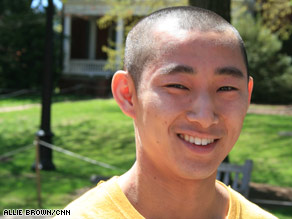Fighting poverty one campus at a time
- Story Highlights
- Shin Fujiyama's Students Helping Honduras aids children and families in need
- The campaign has grown to 25 campuses and raised more than $750,000
- Group members are helping to rebuild a village devastated by a 1998 hurricane
- Do you know a hero? Nominations are open at CNN.com/Heroes
FREDERICKSBURG, Virginia (CNN) -- Shin Fujiyama's life has been highlighted by second chances.

Shin Fujiyama's organization, Students Helping Honduras, has raised more than $750,000.
Born in a fishing village in Japan, Fujiyama, 25, recalls a childhood dominated by health concerns. Doctors told his parents that he had a hole in his heart and "they didn't think I had lot longer to live." But during a later visit to the doctor, Fujiyama says, his family learned the hole had closed.
"Somehow I was cured and I became a normal kid," Fujiyama says. "And I had a second chance."
During his sophomore year at the University of Mary Washington in Fredericksburg, he volunteered in Honduras with a campus group and was struck by the extreme poverty he saw -- barefoot children collecting cans and sleeping in the streets. Fujiyama says he realized he could help give other children their own second chance.
Today, his organization, Students Helping Honduras, brings education and community projects to children and families in need through student service trips and fundraisers. Do you know someone who should be a CNN Hero? Nominations are open at CNN.com/Heroes
"Seeing the country and being able to make a difference really opened my eyes to a lot of things," he says. "I saw such a great need. I wanted to keep helping."
He started by telling his friends about his experience and collecting spare change at his two campus jobs, but Fujiyama found that organizing other students didn't happen so easily.
"When I had my very first meeting, I got all dressed up. And only two people showed up," he says. "I knew I had to keep fighting."
He enlisted his younger sister, Cosmo, then a student at the College of William & Mary in Williamsburg, Virginia, to the cause.
"She's dynamite," he says. "When she talks in front of a crowd, she can move mountains. Knowing that she was behind it, I knew I could do anything."
Since 2006, the siblings' grass-roots campaign to help Honduras has grown to 25 campuses and raised more than $750,000 to fund projects, including the construction of two schools and the establishment of scholarships to help young women attend college.
Fujiyama says students are deeply committed to the organization because they are involved on every level: They raise money and then travel to Honduras to help build houses.
"We make friends with all the kids, all the families -- no matter where we're from. We've had people from all over the world come to Honduras with us. And it's a great network we've made," he says. ![]() Watch Fujiyama and his group in action »
Watch Fujiyama and his group in action »
While Fujiyama spends his summers in Honduras working alongside volunteers, he spends a large portion of the year on the road visiting colleges to organize chapters and raise funds. Cosmo Fujiyama, 23, lives in Honduras full time to coordinate the group's building efforts on the ground.
Students Helping Honduras is working with community members of Siete de Abril to build a new village. Many of the families lost their belongings to Hurricane Mitch in 1998.
"A lot of them are single mothers. They don't own the land. They all live in cardboard houses. They don't have access to clean water [or] health care, and they didn't have a school," Shin Fujiyama says.
Fujiyama's group helped villagers purchase a new plot of land to rebuild. Its members have helped build 44 homes in the village that has been newly named Villa Soleada ("Sunshine Village"). The organization also is raising funds to build a water tower, an eco-friendly sanitation system and a library and to help provide electricity. ![]() Watch Fujiyama describe how the village came to be »
Watch Fujiyama describe how the village came to be »
For Fujiyama, who deferred medical school to dedicate himself to his mission in Honduras, the lifestyle is a far cry from private practice, but he says he loves what he is doing. ![]() Watch Fujiyama describe how a second chance and a trip to Honduras changed his life »
Watch Fujiyama describe how a second chance and a trip to Honduras changed his life »
"I feel like we're making a huge impact. Some people might think that you have to be somebody famous or a millionaire or a doctor to do something," he says. "But we're just everyday students -- people in their 20s. We can do so much. We've got so many things going for us. ... It's just about leveraging what we have. And we have done a great job at that."
Want to get involved? Check out Students Helping Honduras and see how to help.
No comments:
Post a Comment